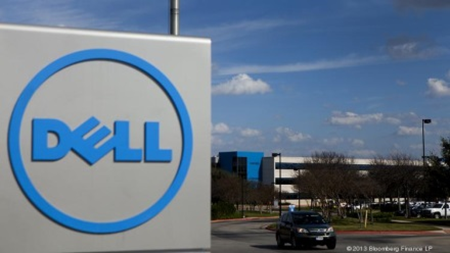|

TechFlash
200 people, 300 hours of meetings and $25M: Details of Blackstone's
due diligence to buy Dell
Dec 8, 2015, 7:00am CST
Updated
Dec 9, 2015, 3:41pm CST
Dell Inc.’s go-shop period in the
run-up to its 2013 shareholder buyout prompted the Round Rock tech
giant to pay another prospective buyer as much as $25 million in
due-diligence expenses. What's more, it caused a prospective Dell
customer to have concerns the buyer would replace CEO
Michael Dell, according to
recently released court documents.
The Delaware court
filing made in connection with a continuing shareholder appraisal
lawsuit offers a rare glimpse at the inner workings of the $24.9
billion Dell buyout by Silver Lake Partners LP and
Michael Dell, that took almost a
year to complete.
 |
Round
Rock-based Dell Inc. paid $25 million in due diligence expenses
of a New York firm that considered a competing shareholder
buyout offer in 2013.
Sam Hodgson |
The other prospective
buyer, New York-based private equity firm Blackstone Group LP (NYSE:
BX), collected the $25 million from Dell to pay for scores of workers
to comb through Dell’s financial records to
determine what it should bid for the company
after an investor group led by
Michael Dell proposed $13.65 per
share, according to a filing authored by
Harvard University Law School
Professor
Guhan Subramanian. Subramanian
was hired by the minority shareholders who objected to the buyout
price.
The report filed with
the court indicates that the odds were against the Blackstone Group as
it tried to complete the due diligence in six weeks allowed by the
go-shop period compared with the six months of due diligence
investment firm California-based Silver Lake Partners did when backing
Michael Dell in the buyout.
The Blackstone Group
assigned 200 workers and generated 300 hours of meetings with Dell
executives before pulling out of the process that Dell’s board
initiated in search of a counter offer. According to Subramian's
report in the court documents, the deck was stacked in favor of
Michael Dell’s investor group
because a superior bid, if accepted, would have alienated
Michael Dell as CEO of the
privately held company.
Gary Lutin — chairman of
Shareholder Forum, a company that moderates disputes between
shareholders and companies — said Silver Lake Partners and the
Blackstone Group weighed two broad factors when considering buyout
offers.
“One is to pay an
amount for a company that doesn’t leave a safe discount to its
intrinsic value,” said Lutin, whose company is neutral in the Dell
case but provides administrative support to shareholders. “And the
other is to invest in a company that’s going to be run by a
strong-willed leader like Dell after you’ve wrecked his sweetheart
deal and bid up the price he has to pay for his stock.”
The buyout took eight
months and weathered challenges by activist investor Carl Icahn — plus
it took several votes by shareholders to complete. After at least one
failed vote, Dell’s special committee changed the buyout rules to
consider non-votes, which initially accounted for 27 percent of the
total, as those in favor of the buyout instead of against.
Subramanian couldn’t
be reached for comment. Dell spokesman David Frink confirmed the $25
million due diligence expense but declined comment, citing the
on-going lawsuit.
Blackstone Group
spokeswoman Christine Anderson declined to confirm the final amount
Dell paid Blackstone or the number of employees involved in the due
diligence. The firm initially offered $14.25 per share before
withdrawing it bid in April 2013 due in part to "the rapidly eroding
financial profile of Dell."
Dell, the No. 3
computer maker in the world, employs about 13,000 workers in Central
Texas, down from about 14,000 last year.
Although Dell
eventually paid shareholders $13.75 per
share, attorneys for the more than 100 minority
shareholders objecting to the price are now asking for more than
double — or $28.61 per share, according to a Nov. 18 post-trial
opening brief.
The Subramanian report
also includes an anecdote that underscores how tech buyers look for
stability with their vendors. It also reveals the level of
Michael Dell’s involvement in the
company’s business operations.
In April 2013, two
months after
Michael Dell announced his buyout
plans, Reuters reported that Blackstone had “extensive discussions”
with Michael Capellas, former CEO of Compaq Computer Corp., who was a
possible candidate for Dell’s CEO position post buyout.
Michael Dell sent a
“sharply-worded e-mail” to Blackstone Group Senior Managing Director
Chinh Chu complaining that such reports cause concern for prospective
customers, according to Subramanian’s report.
“This evening I was
having dinner with a potential customer worth over $600 million in
revenue to our company,”
Michael Dell wrote. “They were
reacting quite negatively to the story and others like it. The
customer was suggesting ways to contractually protect themselves from
the risks associated with …the kinds of changes suggested in press
speculation. I am disappointed by the real damage stories like this
and others are inflicting on our business.”
Shareholder appraisals
typically take 18-24 months. But the size and complexity of the Dell
buyout make this case anything but typical. In mid-2014, the
Shareholder Forum requested Dell lawyers withdraw a long list of
demands for documentation from the minority shareholders to avoid a
delay in reaching an agreement.
A ruling on the
appraisal is expected in February or March, Lutin said.
Christopher Calnan
covers technology, finance and clean energy for the Austin Business
Journal. |


